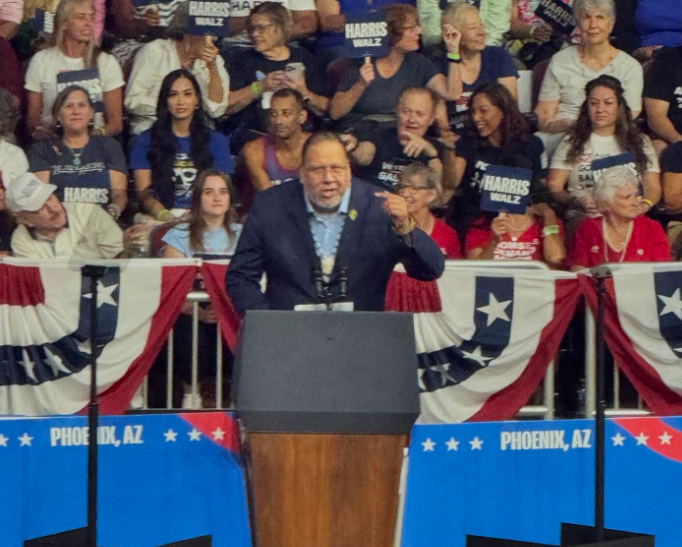
- Details
- By Levi Rickert
Native Vote 2024. Vice President Kamala Harris, the Democratic Party 2024 presidential nominee, made an appeal for the Native vote on Friday evening. She made her comments during a rally at the Desert Diamond Arena in Phoenix before a crowd of over 15,000, according to the Harris for President campaign.
“I will always honor tribal sovereignty and respect tribal self-determination and fight for a future where every Native person can realize their aspirations, and every Native community is a place of opportunity,” Harris said.
It was the vice president's biggest appeal to garner the Native vote in the upcoming election to date since she announced her candidacy for president. Harris entered the presidential race almost three weeks ago, soon after President Joe Biden surprised Americans by saying he was withdrawing from the presidential race.
Harris’ appeal to Native voters was intentional on Friday because Arizona is home to 22 federally recognized, including a great swath of the Navajo Nation in the northeast corner of the state.
The Harris for President campaign acknowledges it needs the Native vote in the upcoming election. Arizona’s Native vote is particularly important because in 2020 President Biden won the state by three-tenths of a percent–or 10,457 votes. Many political analysts cite the Native vote, which on some reservations voted nearly 90% for Biden, as helping to put him over the top in Arizona.
Gila River Indian Community Gov. Stephen Roe Lewis opened the rally.
"I enthusiastically support President Biden’s choice of Vice President Harris as his replacement on the Democratic ticket. I have personally witnessed her grit, drive and commitment to our country, @gilariver and to Indian country. She will be a tireless advocate supporting tribal sovereignty including the treaty and trust responsibility. She is the right person at the right time to be our Country’s 47th President! Skoden." Lewis said.
Minnesota Lt. Gov. Peggy Flanagan (White Earth Ojibwe), who if the Harris-Walz ticket is elected in November will become the first Native American female governor in history, was interviewed on MSNBC's "The Saturday Show with Jonathan Capehart" on Saturday. When asked by host Jonathan Capehart what Harris' comments meant to her.
"It means everything. I think the power of the moment of just being seen and heard and valued. The Biden-Harris administration has done more for Indian Country than any other administration prior," Flanagan said. "I am over the moon. We take her leadership incredibly seriously and value her as a leader...her comments just speak to her connection with all people and with Native folks."
Harris’ appeal to the Native vote in her Friday speech to honor tribal sovereignty and tribal self-determination is a continuation of how the Biden-Harris administration has demonstrated a government-to-government stance towards tribal nations since taking office in January 2021.
Tribal sovereignty remains one of the main issues for Native American when they are polled, including in polls conducted by Native News Online.
Harris and Walz were in Phoenix Friday evening as part of a multiple-state blitz to swing states. Since choosing Walz on as her running mate on Tuesday morning, the Harris-Walz ticket has visited Philadelphia, Penn., Eau Claire, Wisc., Detroit, Mich., and Phoenix, Ariz. At all stops, the rallies have drawn large enthusiastic crowds.
Tonight, the ticket will rally in Las Vegas.
More Stories Like This
Native News Weekly (August 25, 2024): D.C. BriefsUS Presidents in Their Own Words Concerning American Indians
Letter from Publisher: We Fell Short of Our Online Year-End Goal
Happy New Year 2026 from Native News Online
Next on Native Bidaské: Covering Indian Country: Lessons from 2025 & the Road Ahead
Help us defend tribal sovereignty.
At Native News Online, our mission is rooted in telling the stories that strengthen sovereignty and uplift Indigenous voices — not just at year’s end, but every single day.
Because of your generosity last year, we were able to keep our reporters on the ground in tribal communities, at national gatherings and in the halls of Congress — covering the issues that matter most to Indian Country: sovereignty, culture, education, health and economic opportunity.
That support sustained us through a tough year in 2025. Now, as we look to the year ahead, we need your help right now to ensure warrior journalism remains strong — reporting that defends tribal sovereignty, amplifies Native truth, and holds power accountable.
 The stakes couldn't be higher. Your support keeps Native voices heard, Native stories told and Native sovereignty defended.
The stakes couldn't be higher. Your support keeps Native voices heard, Native stories told and Native sovereignty defended.
Stand with Warrior Journalism today.
Levi Rickert (Potawatomi), Editor & Publisher


